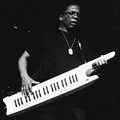Herbie Hancock is one of those living jazz greats whose compositions, whenever we catch them — perhaps playing in the background in a restaurant or bar, or overheard on the radio, — are familiar to most of us, even those who have no idea who the man behind them is. He has written a slew of jazz standards (“Watermelon Man,” “Cantaloupe Island,” “Maiden Voyage,” and many others), composed for films (he received the Academy Award for “Round Midnight” in 1986), was the Charles Eliot Norton Professor of Poetry at Harvard University in 2014 (see below), and has been a significant influence and experimental jazz “rule-breaker” for decades. It’s been an honor for many great performers to share the stage with him (one can see this, for example, in his 2010 “Imagine Project” album and live performance — again, see below).
(Wikimedia Commons, public domain)
What undergirds his life and music, as he has made abundantly clear in nearly every interview he’s ever given, is his commitment to Nichiren Buddhism — a form of Buddhism that has at its heart the chanting of Nam Myoho Renge Kyo (which can be translated as "Devotion to the Mystic Law of the Lotus Sutra," or "Glory to the Dharma of the Lotus Sutra"). Hancock tells about this daily devotion here and more fully in this video, which is one of his Harvard lectures from 2014:
For more on the history of the struggles of Nichiren Buddhism, this documentary is worth a look:
There is no single work of Hancock’s to which I can point that expresses “best” the influence of his Buddhist practice on his music. I can, however, leave you with two videos of live performances, one from 2006 and the other being his taped “Imagine Project” performance of 2010 in Montreux. I believe that if you watch him in action, listen to his words, and pay special attention to the music, you won’t fail to “feel” the vitality of his faith being channeled through it all.
From 2006:
And the “Imagine Project,” live in Montreux:




The funky phrasing that comes out of that Roland is such a joy, one can really begin to hear the voice, shrāvaka.